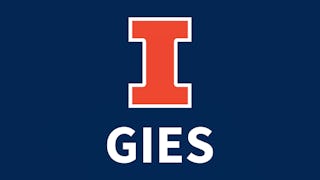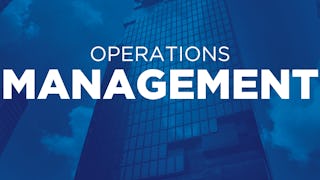This comprehensive course delves into operations management and process improvement principles and techniques, providing you with the knowledge and skills necessary to identify and eliminate inefficiencies in your organization. You will gain a solid foundation in operations management by analyzing key concepts such as cost-quality trade-offs, the efficiency frontier, and system inhibitors.

Enjoy unlimited growth with a year of Coursera Plus for $199 (regularly $399). Save now.

Introduction to Operations Management
This course is part of Business Foundations Specialization

Instructor: Christian Terwiesch
163,118 already enrolled
Included with
(2,828 reviews)
What you'll learn
You will learn to analyze processes, optimize flow, and manage variability, driving improvements and achieving excellence in operations management.
Skills you'll gain
- Continuous Improvement Process
- Inventory Management System
- Lean Methodologies
- Capacity Planning
- Quality Management
- Process Flow Diagrams
- Statistical Process Controls
- Operations Management
- Process Improvement
- Operational Efficiency
- Workflow Management
- Process Analysis
- Supply Chain Management
- Process Management
- Root Cause Analysis
Details to know

Add to your LinkedIn profile
3 quizzes, 15 assignments
See how employees at top companies are mastering in-demand skills

Build your subject-matter expertise
- Learn new concepts from industry experts
- Gain a foundational understanding of a subject or tool
- Develop job-relevant skills with hands-on projects
- Earn a shareable career certificate

There are 4 modules in this course
At its core, operations management is about finding and then reducing inefficiencies. We will start by examining key concepts such as cost-quality trade-off, the efficiency frontier, and three system inhibitors. We will also explore process analysis, enabling you to identify and analyze the steps involved in a process and make changes to improve its outcomes. By the end of this module, you will have opportunities to practice these concepts by creating process flow diagrams and calculating the resource with the lowest capacity. Additionally, you'll be able to practice calculating capacity, flow rate, and utilization. You will be able to transfer these skills to initiate process analysis within your organization.
What's included
6 videos4 readings4 assignments
In operations management, flow focuses on the movement of materials, products, and information through the various stages of a production or service process. Lean operations focus on identifying sources of waste both in terms of resources and processes. Optimizing flow can improve productivity, reduce costs, and enhance customer satisfaction. By learning to carefully observe how work is done, we can become better at identifying waste. The goal is to create efficient and effective processes that maximize output while minimizing waste.
What's included
10 videos4 readings2 quizzes5 assignments
Little's Law, a foundational concept in operations management, helps quantify and evaluate the efficiency and effectiveness of a system by providing key performance indicators. By understanding the relationship between inventory, arrival rate, and cycle time, managers can make informed decisions regarding capacity planning. Little’s Law also serves as a diagnostic tool for process improvement initiatives and is particularly valuable in supply chain management, where it enables companies to optimize inventory levels, reduce lead times, and enhance coordination among various stages of the supply chain. It helps strike a balance between supply and demand, improving overall responsiveness and customer service.
What's included
4 videos2 readings4 assignments
Variability can introduce defects and hinder the pursuit of excellence. By recognizing and managing variability, organizations can lay the foundation for consistent and exceptional quality standards. This module introduces frameworks that provide systematic ways to analyze variability. We’ll look at how statistical analysis and problem-solving methodologies can enhance quality. We’ll also explore the power of real-time information and how it fosters continuous improvement. We’ll examine strategies for finding the root cause of an issue and explore how we might develop targeted solutions as we unravel complex problems.
What's included
7 videos2 readings1 quiz2 assignments
Earn a career certificate
Add this credential to your LinkedIn profile, resume, or CV. Share it on social media and in your performance review.
Instructor

Offered by
Explore more from Leadership and Management
 Status: Preview
Status: Preview Status: Free Trial
Status: Free TrialSimplilearn
 Status: Free Trial
Status: Free TrialUniversity of Illinois Urbana-Champaign
 Status: Free Trial
Status: Free TrialFundação Instituto de Administração
Why people choose Coursera for their career




Learner reviews
2,828 reviews
- 5 stars
68.15%
- 4 stars
18.84%
- 3 stars
6.53%
- 2 stars
2.72%
- 1 star
3.74%
Showing 3 of 2828
Reviewed on Oct 27, 2018
This is an awesome comprehensive operations management course. Although, the course in an introductory course, it covers pretty much everything you need to know about operations management.
Reviewed on Mar 6, 2016
very objective and hands on structure. Excellent for working executive as well, gives a hands on refresher with the help of best and latest on the subject. very concise and focused.
Reviewed on Aug 24, 2020
Great Instruction by Prof Christian - very lucid and with real world examples. Learning a business skill is mostly learning observation.. Now I know what to observe when looking for productivity!

Open new doors with Coursera Plus
Unlimited access to 10,000+ world-class courses, hands-on projects, and job-ready certificate programs - all included in your subscription
Advance your career with an online degree
Earn a degree from world-class universities - 100% online
Join over 3,400 global companies that choose Coursera for Business
Upskill your employees to excel in the digital economy
Frequently asked questions
To access the course materials, assignments and to earn a Certificate, you will need to purchase the Certificate experience when you enroll in a course. You can try a Free Trial instead, or apply for Financial Aid. The course may offer 'Full Course, No Certificate' instead. This option lets you see all course materials, submit required assessments, and get a final grade. This also means that you will not be able to purchase a Certificate experience.
When you enroll in the course, you get access to all of the courses in the Specialization, and you earn a certificate when you complete the work. Your electronic Certificate will be added to your Accomplishments page - from there, you can print your Certificate or add it to your LinkedIn profile.
Yes. In select learning programs, you can apply for financial aid or a scholarship if you can’t afford the enrollment fee. If fin aid or scholarship is available for your learning program selection, you’ll find a link to apply on the description page.
More questions
Financial aid available,

